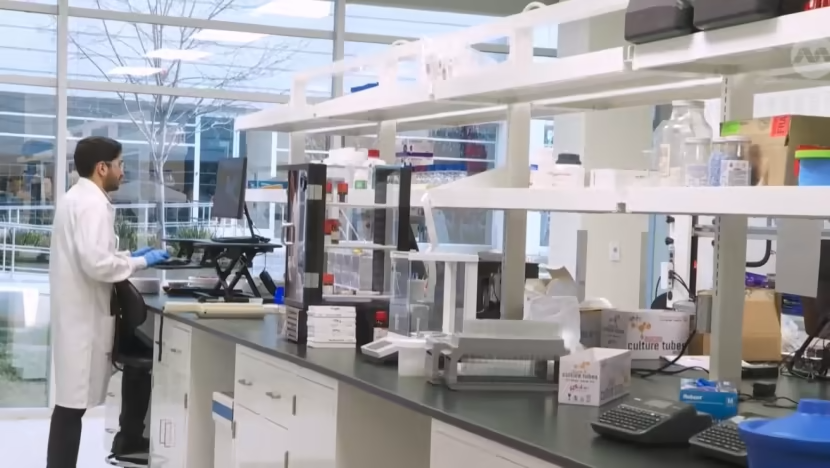Singapore biotech firms expand to the US, drawn by market size and experienced workforce
12 April, 2023

Singapore healthcare and biotech companies are making a bigger play in overseas markets like the United States, drawn by the country’s large market size and resources.
Among them is Singapore biotech start-up Lucence, which developed a blood test to profile cancer. The liquid biopsy tests, which it started using in Singapore in 2018, is said to be much less invasive than conventional tissue biopsy and takes less time to administer and diagnose.
The firm expanded to Silicon Valley three years ago. The move has enabled them to reach two-and-a-half times more patients in 2022 compared to the year before, said the firm’s CEO Dr. Tan Min-Han.
He noted that there are 19 million cancer patients diagnosed every year, with over 50 per cent presenting in late stage.
“Every two seconds, a new cancer patient is diagnosed, and I believe that having technology like ours is going to be critical not just to the United States, not just to Asia, but to the world,” he told CNA.
"It's very much about making sure our technology can supply a very large market. And also, at the same time, we are always learning from our experiences both in the West and the East, so that we can continue to grow this technology globally,” he added.
US AS SOURCE OF TECH, INNOVATION, MANPOWER
The US is the right place for the firm’s expansion plans, according to Enterprise Singapore (ESG). The government agency has been linking medical firms up with potential partners and providing grants to help them scale up in the US market.
Mr Clarence Hoe, executive director for Americas and Europe at ESG, said that the US has several research institutions and a vibrant start-up community that offers some of the “top frontier technologies” and commercialises them. “Singapore companies can see the US as a source of technology and innovation to partner them for these capabilities and look at how we can fine tune their value proposition and expand either in the US or in other parts of the world,” he said.
The US is also seen as a source of top talent in the field, a big part of what drew Singapore-based biomedical firm Engine Biosciences to San Francisco five years ago.
The company develops drugs for cancer patients, and said the biologists and chemists in the US have more experience in the field than those back home.
"The US generally is the most innovative in terms of the biopharma space. It's also one of the largest markets in terms of revenue,” said the firm’s chief business officer Peter Ho.
He added that many of the large biotech companies and biopharma companies are located in the US, creating a “really good ecosystem in terms of innovation, talent, as well as capital".
The industry is seeing increasing investments after a lull due to the pandemic. The US medical devices market is projected to grow to more than US$255 billion (S$339 billion) by the end of the decade.
TRYING TO ENTER THE US EDUTECH SECTOR
Another sector that Singapore companies are trying to break into is the US educational tech industry.
Edutech companies globally have enjoyed investments of nearly US$48 billion (S$64 billion) since the pandemic struck in 2020, more than the sector received in funding over the previous decade.
Among the firms vying for a slice of the pie in the US is Ottodot, which creates games on online platform Roblox based on Singapore's science syllabus.
It has been actively pitching to Silicon Valley investors to bring a taste of the local education system to America.
"We looked at all the curriculum in different countries and realised that Singapore's science syllabus overlaps like 60-70 per cent with other countries,” said the firm’s co-founder Lei Wong Lei.
“We look at how this curriculum can support middle schools or high schools in other countries and it does it very well. Singapore's brand in terms of education is very strong.”
She believes that with perceptions of gaming changing globally, and more acceptance of gaming for education, Ottodot has potential to grow in the US.
“I think the line between entertainment and education will slowly blur,” she said.
TEACHING WOMEN ABOUT DIGITAL ASSETS
Similarly, Metaverse design agency Smobler Studios wants to expand into the US market, as part of its efforts to make sure no one is left behind as the tech scene continues to evolve.
The firm conducts classes for young women who feel they do not have the same professional opportunities as men.
"We will go into these institutions to teach girls how to create digital assets. This is crucial because these digital assets can then be monetised, and sold in a marketplace,” said the company’s CEO Loretta Chen.
“We're using this as a foundational pillar or building block for young women and girls to understand digital asset creation, digital ownership and eventually guide them towards a path of financial literacy and entrepreneurship.”
These businesses are working with ESG to find more partners in the US. However, it can be an uphill battle, said the agency’s Mr Hoe.
While Singapore “punches above our weight” in many areas, people in bigger and farther countries may not know of the island-state’s capabilities, he said.
“There's still a lot that we need to do to build the mindshare and to share who we are,” he said.
“Sometimes, it's very difficult to get them to speak to us when we do call them… So we need to build that up by being able to be persistent on our end, but more importantly to be able to participate in more networking, more seminars and conferences.”
Source: www.channelnewsasia.com
